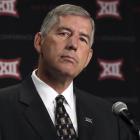It wouldn't be Selection Sunday without a gripe from someone. It just doesn't always come from the person you'd expect.
With Penn State being left out of the playoff in favor of Ohio State, you'd think the Nittany Lions would have the biggest grudge with the outcome. After all, they won the Big Ten title and beat the Buckeyes head to head. But, no, coach James Franklin was surprisingly chill about the whole thing.
Rather, it was Big 12 commissioner Bob Bowlsby, who expressed his dissatisfaction with the decision-making and outcome of Sunday's announcement. Namely, Bowlsby had a beef with two things:
1. That No. 4 Washington was selected despite an out-of-conference strength of schedule featuring such formidable opponents as Rutgers, Idaho and Portland State.
2. That No. 3 Ohio State was able to get in without playing for, let alone winning, its conference championship.
Both matters hit close to home for Bowlsby. Baylor has been lambasted for its non-conference scheduling policy over the past few years and it was an especially big deal in 2014 when the Bears, 11-1 and conference co-champions with TCU, failed to crack the top four. Baylor's non-conference schedule included Northwestern State, Buffalo and SMU.
Additionally, TCU dropped from No. 3 to No. 6 that year despite beating Iowa State 55-3 in the final game of the season. Meanwhile, Ohio State jumped into the top four after winning the Big Ten Championship Game. The Buckeyes would later go on to win the national title.
"Obviously I acknowledge the difficulty of the task, but I'm not sure what I advise my members right now, because we've been telling them that nonconference schedules matter, and one of the four has an exceedingly weak nonconference schedule," Bowlsby said (via ESPN). "And we've been telling them the 13th data point matters, and we added a conference championship game because of that. We've always heard that conference championships matter and division championships matter, and now it's confusing."
All of this, of course, is made more interesting by the fact that the playoff committee's spokesperson is Kirby Hocutt -- the athletic director at Texas Tech.
Still, Bowlsby has a good point in that two of his teams were punished for things not applied this time around. He has extra reason to be frustrated since the Big 12 opted to bring back its championship game for 2017 in order to get that extra quality game.
Bowlsby "Does the 13th data point make a difference or does it not? Does the conference championship game make a difference or does it not?"
— Jake Trotter (@Jake_Trotter) December 4, 2016
But as we saw Sunday, Ohio State proved a team doesn't necessarily need a "13th point" to have an edge. That's a strike against the Big 12's supposedly "disadvantaged" format. Plus, Oklahoma got into the playoff last year despite having played only 12 games.
(Related: if the Big 12 had a conference championship game this year, it would have put Oklahoma and Oklahoma State in a second consecutive matchup after the Sooners beat the Cowboys 38-20. Who wants that game twice in a row?)
Ohio State benefited from a strong resume, which included a convincing 45-24 win over the Sooners in early non-conference play. It got in because it scheduled tough outside its conference and won. There's a risk to scheduling tough -- scheduling down provides a clearer path -- but we now have an example of that effort being rewarded.
While hypotheticals are irrefutable in the worst way, it stands to reason Oklahoma would have been in much better playoff shape if it had beaten the Buckeyes in that game. And Ohio State probably wouldn't have been in the conversation. (To be clear, Bowlsby said he wasn't championing the Big 12 for playoff inclusion.)
Equally true:
— Matt Hinton (@MattRHinton) December 4, 2016
If Oklahoma's non-con schedule was easier Sooners would be in.
If Ohio St's non-con schedule was easier Buckeyes would be out.
As for Washington, it got a 12th win by laying waste to a top-10 opponent in Colorado. Moving the Huskies down after that would be a tough assignment.
None of this means Bowlsby is wrong. Pointing out gaps in logic and general hypocrisy is warranted, and a glance over the first three playoff fields shows #brands matter. But the Big 12 also continues to chase a moving goal post. The beauty and frustration of a human selection committee is that there is no formula for playoff inclusion. It's far to early to call precedent or determine trends. No two years in college football are the same and the committee's decision making reflects that.
So when Bowlsby makes comments like these, he's forgetting one important point:
Everyone's just making this up as they go along.





















